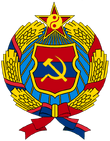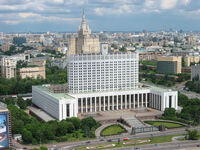| Великая Социалистическая Народная Союз Бурятия | |||||
|---|---|---|---|---|---|
| Socialist Union of Vauleyo-Buryatia | |||||
| |||||
| Motto ‘For the Motherland! For Vauleya!’ |
|||||
| National Anthem: ‘Vauleya is not yet lost’
Royal Anthem: ‘O land of the Sacred Lake’ |
|||||
| Capital | Petrograd | ||||
| Official language Regional languages |
Vaulian, Buryatian Russian |
||||
| Demonym | Vauleyo-Buryatian | ||||
| Government Type - Imperator - President - Speaker of the Khural |
Monarchy Pyotr I M. Anyatevich N.Ivaanjav |
||||
| Major Religions | Vaulian Orthodox Christianity | ||||
| Formation - Treaty of Zemlya - Independence from Soviet Union - Treaty of Union |
December 1675 January 7,1989 March 25,2009 |
||||
| Total Area | 5,518.238sq. miles | ||||
| Total Population - Main Ethnicity |
11,657,700 Buryatian |
||||
| Currency | VB Rouble | ||||
| Nominal GDP - Total - Per Capita |
2009 estimate B$ 1.13 Trillion B$96,931 |
||||
| Literacy Rate | 100% | ||||
Nation History[]
Although Vauleyo-Buryatia has a short history, it's predecessor states Vaule and Buryatia have a long and sometimes complicated history spanning more than 280 years. The nation of Vaule existed as a series of feudal kingdoms in Central Asia until the Treaty of Zemlya (1675) merged them into one single nation under the leadership of Imperator Stefan IV. The Imperator rapidly consolidated his control over the new nation and strengthened the nation's military.
With the rapid eastward expansion of the Russian Empire in the early 1700s, the Imperator attempted to maintain Vaule's Independence through diplomatic means. The Russian Empire could not be persuaded to halt its march to the east and soon overran Vaule after a prolonged conflict.
Despite periodic rebellions, Vaule remained under the direct control of the Russian Empire for the next 200 years. In 1917, the Russian Revolution led to a sudden weakening of the Russian Empire's ability to enforce control over Vaule. Almost immediately, a group of Vaulians declared the nation independent of the Russian Empire.
The declaration caused a schism in society between those who supported the continued domination of the Russian Empire over Vaule, and those who wished to fight for independence. Seeing an opportunity to take advantage of the situation, the Bolsheviks and their allies reasserted control over Vaule and removed the short lived independent government.
With the formation of the Soviet Union, Vaule became an autonomous Socialist Republic called the 'Vaulian Soviet Socialist Republic', a status it retained until 1985.
Independence[]
In the year 1985, Vaule again declared its independence from the Soviet Union, sparking a major conflict. After two years of continuous fighting, Soviet troops managed to reassert Soviet authority over 2/3 of the country and declared victory in 1987. The Soviet Union then appointed Communist strongman Mikhail Khudorozkina to rule Vaule on their behalf. Although initially thought to be loyal to the Soviet Union, Mikhail Khudorozkina began to import arms for the Vaulian Resistance Army shortly after gaining power.
In 1989, the VRA led a massive uprising against Soviet rule. Unlike previous uprisings, the VRA were better armed and trained and were led by a competent General Mikhail Zhukov. With the determination of the VRA, and the overconfidence of the Soviet Army, the VRA managed to fight the Soviets to a stalemate in 1990. As the casualties mounted on the Soviet side, the government began to reconsider its military offensive. At this stage, General Zhukov gained a critical military victory in the Battle of Ulla-Ude which decidedly turned the tide against the Soviets.
By December of 1990, Vaulian Resistance forces managed to repel Soviet forces from nearly 2/3 of Vaulian territory. Finally, faced with the possibility of another defeat on the scale of their war in Afghanistan, the Soviet Union withdrew their forces from Vaule. At this point, Vaule's de facto independence was recognized by the Soviet Union
Post-Independence era[]
As soon as Independence was declared, Mikhail Khudorozkina was quick to shed his affiliation to the Communist Party of the Soviet Union. In the first post Independence elections, Khudorozkina was swept to power. In less than three months, Khudorozkina declared himself President-for-life and halted the Democratic Reform movement.
Despite gaining the recognition of several countries, Vaule became significantly isolated as Khudorozkina consolidated its control. The longer Mikhail Khudorozkina remained in office, the more isolated and detached from global affairs.
In June of 1991, Mikhail Khudorozkina launched his most dangerous initiative so far, the 'Vaulian Self Sufficiency Initiative'. Almost overnight, President Khudorozkina halted all food and grain imports and ordered local agricultural production to be increased by 400% to compensate for the shortfall.
The rapid change in agricultural policy just months before the harsh Siberian winter created a disaster on a massive scale. Imports continued to be banned while local food production was barely able to keep up with demand, let alone to maintain stocks for the winter. Despite being informed of the situation, President Khudorozkina ordered the program to continue on schedule. As a result, almost 300,000 Vaulians starved to death in the winter of 1991 alone, a claim that Khudorozkina supporters dismissed as mere 'propaganda'.
Zhukov Democratic Revolution[]
By May 1992 as the scale and consequences of President Khudorozkina's decrees gradually leaked to the public, his support eroded rapidly. Faced with another threat to his power, President Khudorozkina shut down the Parliament and proclaimed Martial Law in June 1992.
Khudorozkina's rule continued until he was forced from office by Vaulian war hero General Zhukov in 2006. The military coup was greeted enthusiastically by the population. General Zhukov undertook a rapid revitalization of the Democratic Reform Movement which resulted in free elections in September 2006, and the restoration of the monarchy in August 2006.
General Zhukov, who swept into office as President, undertook several economic and political reforms that are credited with laying the foundations for the modern Vaulian state. General Zhukov's tenure as President was marked by economic growth, a full transition from a Command to a Capitalist economy, and increased civil liberties. President Zhukov also ended Vaule’s international isolation and established ties with other nations in the region. President Zhukov successfully put down two rebellions during his term in office. The first uprising was by Khudorozkina loyalists in Caledonia, and the second by separatists in Outer Mongolia. Shortly after these rebellions, President Zhukov was assassinated.
Post Zhukov era[]
President Zhukov was succeeded by his deputy Dr. Anyatevic for less than three months before Dr. Anyatevic was removed from power and found guilty of his assassination. In the next election, Yuri Rokossovsky and the Socialist Party swept to power. Further reforms were implemented and democratization continued.
Vauleyo-Buryatian era[]
The modern Vauleyo-Buryatian state was founded with the signing of the Treaty of Union (2009). The treaty created a formal union between Vaule and Buryatia.
Legislature[]
The Legislature of Vauleyo-Buryatia is comprised of the Great People's Khural (Parliament). The Khural is a unicameral body made up of 900 members who are elected to serve four year terms. The Khural is responsible for drafting, debating and approving all Legislation and for the confirmation of several government officials. The Khural is required by law to approve all Diplomatic Treaties and to approve a Declaration of War. The Khural is lead by a Speaker who commands the approval of the majority of the Legislature.
The Constitution of Vauleyo-Buryatia also gives the Khural the express power to Impeach the President, if there is a Constitutionally approved reason for doing so. Despite the Khural's legislative powers, it does not have the power to select Government Ministers or to make appointments to the Judiciary. The Constitution also specifies that any legislative powers that are not expressly granted to the Regional Parliaments shall reside with the Khural.
The power to dissolve the Great People's Khural rests with the Imperator of Vauleyo-Buryatia.
Executive[]
The Executive branch of the government of Vauleyo-Buryatia is led by the President and his appointed Deputies. The President of Vauleyo-Buryatia is directly elected by the people of the nation to serve a five year term in office. According to the Constitution, no individual may serve more than three consecutive terms as President. The President is the official Head of Government of Vauleyo-Buryatia and is responsible for coordinating government policy regarding both domestic and foreign affairs. While the President himself does not have the power to write or draft legislation, all legislation must bear the President's signature to be enacted into law. The President is also required to appoint Diplomatic Officials with the consent of the Parliament and, if the need arises, the President has the authority to dismiss the Supreme People's Court of Vauleyo-Buryatia.
The President is also required to appoint all government ministers, with the approval of the Parliament, and is required to appear before the Parliament regularly to answer questions from members of the Khural. This allows the Khural some oversight of the President's policy, and allows open debate in the Parliament on any important government issue.
The Presidency, along with the Great People's Khural form the backbone of the National government of Vauleyo-Buryatia.
| Miroslav Anyatevich | |

| |
3rd President of Vauleyo Buryatia
| |
| In office 30 Sept 2004 – Present | |
| Preceded by | Vladimir Trubachev |
|---|---|
| Succeeded by | Incumbent |
| Political party | Social Democratic Party |
| Religion | Vaulian Orthodox |



